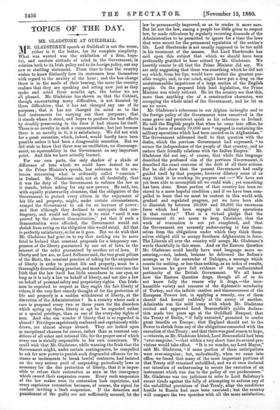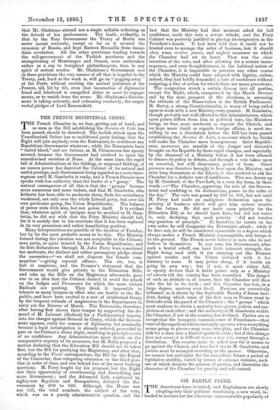TOPICS OF THE DAY.
MR. GLADSTONE AT GUILDHALL.
MR. raGtbLeArDiSsTtOtNtEh'eS better, afte rGuildhall is entoet stile pwl ioersi t ye ,
What was wanted was the exhibition of a firm, hope- ful, and resolute attitude of mind in the Government, in relation both to its Irish policy and to its foreign policy, not any new or startling statement. From time to time the country wishes to know distinctly how its statesmen bear themselves with regard to the anxiety of the hour ; and the less change there is in the mode of their bearing, the more the country realises that they are speaking and acting now just as they spoke and acted three months ago, the better we are all pleased. Mr. Gladstone has shown us that the Cabinet, though encountering many difficulties, is not daunted by those difficulties ; that it has not changed any one of its purposes ; that it has not changed its mind as to the best instruments for carrying out these purposes ; that it stands where it stood, and hopes to produce the best effects by steadily persevering in the lines it had chosen for itself. There is no novelty in such a communication ; but just because there is no novelty in it, it is satisfactory. We did not wish for a great sensation, which, indeed, would hardly have been possible unless it had been a disagreeable sensation. But we did wish to know that there was no vacillation, no discourage- ment, no squeezability in the Government on any important point. And this we have actually learned.
For our own parts, the only shadow of a shade of difference of tone whieh we could have desired to see in the Prime Minister's speech, has reference to the sen- tences concerning what is ordinarily called " coercion " in Ireland. Mr. Gladstone said, not at all doubtfully, that it was the duty of the Government to enforce the law as it stands, before asking for any new powers. He said, too, with equally praiseworthy clearness, that the obligation of the Government to protect every citizen in the enjoyment of his life and property, might, under certain circumstances, compel the Government to ask for an increase of power ; and that although they declined to anticipate that con- tingency, and would not imagine it to exist " until it was proved by the clearest demonstration," yet that if such a demonstration were afforded, the dovernment would not shrink from acting on the obligation this would entail. All that is perfectly satisfactory, so far as it goes. But we do wish that Mr. Gladstone had gone on to say that nothing can be more fatal to Ireland than constant proposals for a temporary sus- pension of the liberty guaranteed by one set of laws, in the interest of the order guaranteed by another set of laws. If liberty and law are, as Lord Selborne said, the two great pillars of the State, the constant practice of asking for the suspension of liberty in order to protect life and property, must be a thoroughly demoralising practice, and must tend to convince the Irish that the law itself has little sacredness in our eyes, so long as it is only a law on behalf of liberty, and not also a law on behalf of personal safety and proprietary rights. Can Irish- men be expected to respect as they ought the fair liberty of others, if the very first remedy thought of for the protection of life and property is a sudden withdrawal of liberty, at the discretion of the Administration ? In a country where such a cure is proposed every two or three years for the disorders which spring up there, liberty is apt to be regarded rather as a special privilege, than as one of the every-day rights of men. And who can wonder if liberty that is so regarded is abused ? Privileges capriciously conferred and capriciously with- drawn, are almost always abused. They are looked upon as exceptional chances for excess, rather than as constant con- ditions of all sober and rational life, for the proper use of which every one is strictly responsible to his own conscience. We could wish that Mr. Gladstone, while warning the Irish that the Government might, under certain contingencies, be compelled to ask for new power to punish such disgraceful offences for in- stance as incitements to break lawful contracts, had insisted on the very serious peril of suspending periodically laws so necessary for the due protection of liberty, that it is impos- sible to refuse their restoration as soon as the emergency which caused their suspension ceases. Every such suspension of the law makes even its restoration look capricious, and every capricious restoration becomes, of course, the signal for conduct inviting a fresh suspension. If the detection and punishment of the guilty are not sufficiently assured, let the
law be permanently improved, so as to render it more sure. But let not the law, among a people too little given to respect law, be made ridiculous by regularly recurring demands of the Administration to be permitted to ignore for a time the laws that were meant for the permanent regulation of the nation's life. Lord Sherbrooke is not usually supposed to be too mild in his treatment of the masses. But Lord Sherbrooke has said upon this subject that which we should have been profoundly gratified to hear echoed by Mr. Gladstone. We heartily concur in all that the Prime Minister did say. We are only suggesting that there was something which he did not say which, from his lips, would have carried the greatest pos- sible weight, and, to our mind, might have put a drag on the unstatesmanlike impatience of a large section of the English people. On the proposed Irish land legislation, the Prime Minister was wisely reticent. He let the country see that this, more than anything else of a constructive character, was occupying the whole mind of the Government, and he let us see no more.
Mr. Gladstone's references to our Afghan imbroglio and to the foreign policy of the Government were conceived in the same grave and persistent spirit as his reference to Ireland. He told the English people that when he came into office, he found a force of nearly 70,000 men " engaged in sustaining the military operations which had been carried on in Afghanistan." The Government addressed itself to that question with the desire, which the previous Government had expressed, " to secure the independence of the people of that country, and to restore their friendly relations with the Indian Empire." Mr. Gladstone did not say, of course, that while this language described the professed aim of the previous Government, it described the exact converse of the drift of all their actions. But he did show that the present Government had really guided itself by that purpose, however dilatory some of us may think it in working its purpose out :—" We have not yet been able to accomplish all we could wish ; yet something has been done. Some portion of that country has been re- stored to a more hopeful condition ; and if we have been com- pelled to learn that we must be content in this world with gradual and regulated progress, yet we have been able to diminish by between 20,000 and 30,000 the enormous force which had been engaged in military operations in that country." That is a virtual pledge that the Government do not mean to keep Candahar, that the work of evacuation is not yet completed, and that the Government are earnestly endeavouring to free them- selves from the obligations under which they think them- selves obliged still to occupy Southern Afghanistan in force. The Liberals all over the country will accept Mr. Gladstone's words thankfully in this sense. And on the Eastern Question Mr. Gladstone could hardly have used language more re- assuring,—not, indeed, because he delivered the Sultan's message as to the surrender of Dulcigno, a message which counts for nothing, or less than nothing, as an index of results, but because he gave full evidence of the undiminished pertinacity of the British Government. We all know how the Eastern Question drags, though all of us do not know fully the reason why it drags,—the inex- haustible variety and resource of the diplomatic mendacity of Turkey, and the infinite caution and timourousness of the European Powers lest, in applying a remedy, one of them should find herself suddenly at the mercy of another. Admirable was the mild irony with which Mr. Gladstone recited and approved Lord Beaconsfield's public declara- tion made two years ago at the Guildhall Banquet, that the Treaty of Berlin, " if fully executed," promised to confer great benefits on Europe ; that England should not be the Power to shrink from any of the obligations connected with the execution of that Treaty ; and that there was good reason to hope, —wherein, as Mr. Gladstone hinted, Lord Beaconsfield had been "over-sanguine,"—that within a very short time its several pro- visions would take effect. "It is no wonder, my Lord Mayor," said Mr. Gladstone, "if some portion of these anticipations were over-sanguine ; but, undoubtedly, when we came into office, we found that many of the most important portions of that Treaty still remained unfulfilled, and we at once declared our intention of endeavouring to secure the execution of an instrument which was due to the policy of our predecessors." Mr. Gladstone was too judicious to refer to Lord Salisbury's recent tirade against the folly of attempting to enforce any of the unfulfilled provisions of that Treaty, after the conditions hostile to Russia had once been executed ; but the country will compare the two speeches with all the more satisfaction,
that Mr. Gladstone uttered not a single syllable reflecting on the default of his predecessors. The truth, evidently, is that by the Tory Government the Treaty of Berlin was never meant seriously, except so far as it secured the recession of Russia, and kept Eastern Roumelia from imme- diate revolution. All the other provisions tending towards the self-government of the Turkish provinces and the strengthening of Montenegro and Greece, were undertaken rather as a sop to benighted philanthropists, than in any spirit of serious resolve. Mr. Gladstone's Government sees in these provisions the very essence of all that is hopeful in the Treaty, and, hard as the work is, will go on " pegging away " at the Porte, without exciting the mutual jealousies of the .Powers, till, bit by bit, even that incarnation of diplomatic fraud and falsehood is compelled either to meet its engage- ments, or to vanish from the scene. Mr. Gladstone's Govern- ment is taking seriously, and redeeming resolutely, the empty verbal pledges of Lord Beaconsfield.



































 Previous page
Previous page